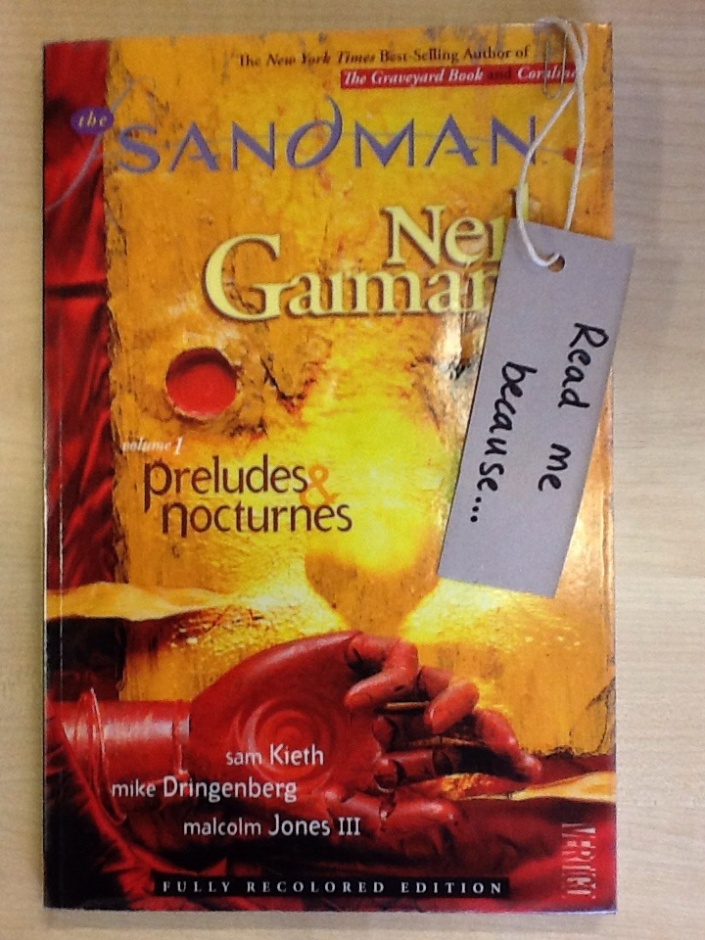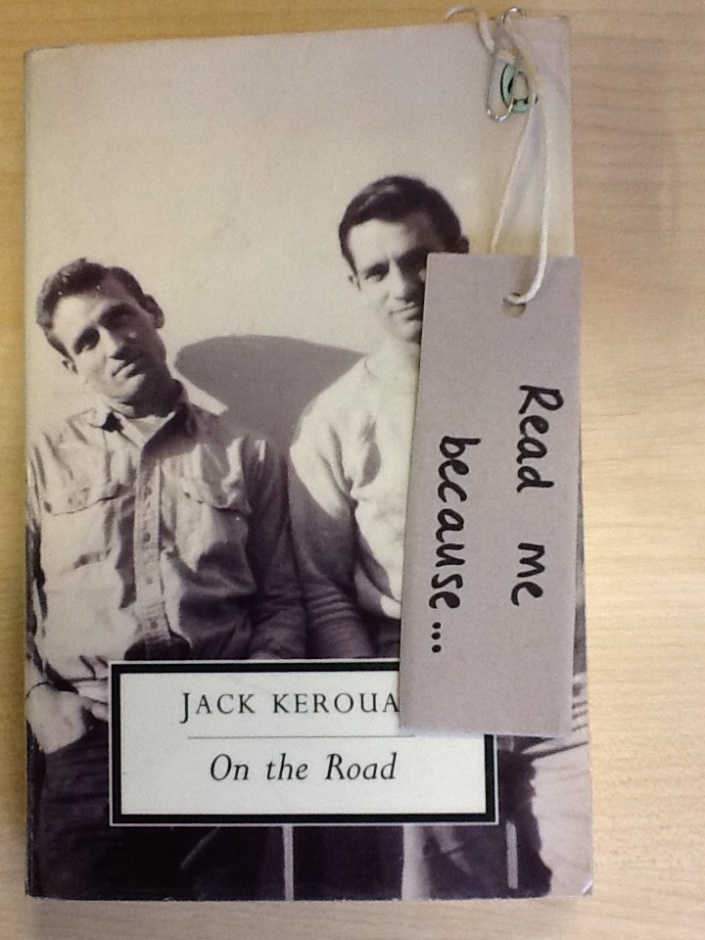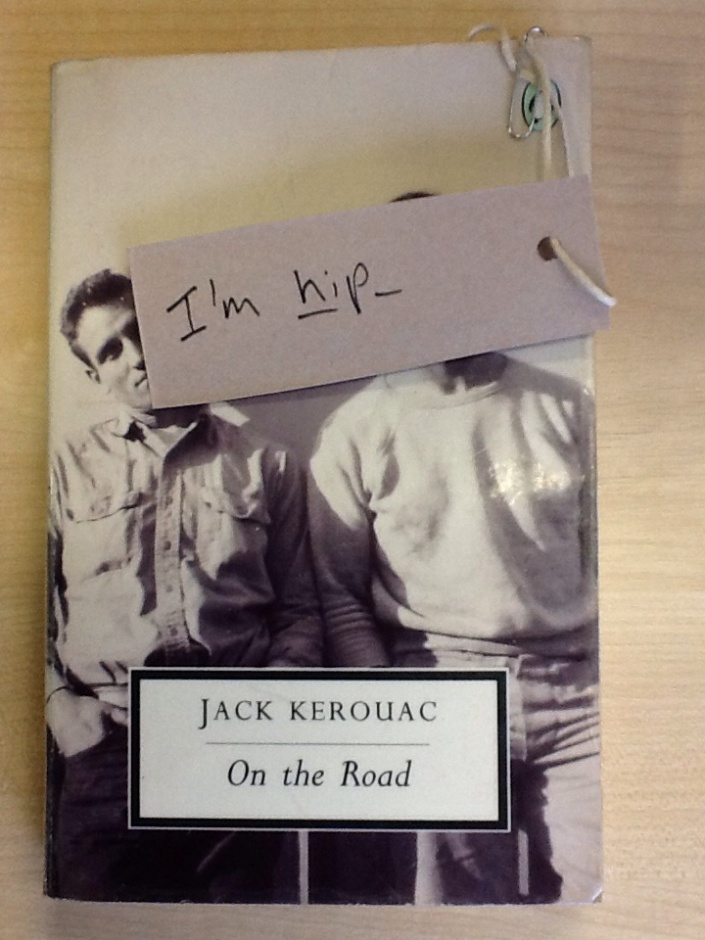Academic libraries
Display work: perks of the new job
So I’ve been in my job, as Librarian / Library Manager at a sixth form college for a month now. It’s had its challenges, but one of the definite upsides of being able to call the shots is the chance to be creative. To mark National Libraries Day, we put together a display of recommended reads for teens in the library:
…with a supporting display in the library entrance:
The book display combined reviews…
…and ‘Read Me Because’ tags to add some context and humour to the novels on display:
London Met is a ghost town
Day one of year two of my MA Information Management at London Metropolitan University. The university building is unfamiliar (my old campus, Ladbroke House, was sold off and shut last year). I get lost in a rabbit warren of contradictorily marked corridors and stairwells, trying to find my dissertation class.
I eventually find the room, but the class has been moved. I have no idea where the new room is, but bump into another part-time student from my course and eventually we find our tutor in a in a far-flung corner of the building.
Although we’re a good fifteen minutes late, there is no-one else in the room. I’m confused by this, as there were supposed to be at least ten new starters on the course this year. It’s worrying, especially as I’d missed out on module choices last year due to a lack of students to sign up for them on the course.
There could be a perfectly simple explanation for the lack of classmates, but a year at London Met has taught me to expect the worst. ‘Is this it?’ I ask our tutor. She replies that yes, it is. Out of 40 provisional applications for the MA, and ten pre-enrolments from new students, no-one has completed their enrolment and no-one turned up to the first classes last Monday. No-one.
If anyone from London Met tries to claim that outsourcing their libraries, selling off their special collections, or failing their foreign students en-mass hasn’t had a negative impact on their intake, try throwing that statistic at them: no-one wanted to commit to take their Information Management course this year.
It’s a well-regarded course, that scored well with inspectors. Everyone who took the full-time MA in 2011-2012 got at least a pass. But no-one wants to do library studies at an institution that doesn’t value its own libraries, and that cuts its support staff to the point where it can’t even keep track of its own students. The fiasco over foreign recruitment at London Met is entirely symptomatic of an institution that values cost-cutting, even when it flies in the face of reason, over its own staff and students.
So thanks, Gillies et al. Thanks to your morally bankrupt and criminally inept running of London Met, I’ll be completing my Information Management degree in a class of three, in an empty, echoing building, on a ghost town campus. Thanks. Thanks a lot.
The shock of the new – freshers week and inductions
It’s freshers’ week. If the dreary October weather and sudden buzz of activity around campus weren’t clues enough, the house plant sale outside the Library building definitely gave the game away.
Freshers’ week means it’s also Library induction week. I don’t think I’m alone in having mixed feelings about inductions. There’s the slight feeling of dread that builds as our teaching calendar gradually fills up during September, until its so full of filled-in lesson blocks that it looks like a badly played game of Tetris. It’s at this stage, in late September, that people start to go a bit Colonel Kurtz
‘The Horror…the…Horror’
However, as soon as the start of term kicks in, and this year’s freshers start rolling through the Library’s doors, the fear turns to determination, which then builds towards a sort of exhausted elation at the end of induction week, dozens of induction sessions and hundreds of students later.
After all, we want to give the new students the best possible introduction to the Library’s services and staff, in the middle of what is a very demanding, disorientating week for them.
It’s also a great chance to show the friendly, welcoming face of the Library, and to plant a few seeds about liaison librarians, e-resources and reference management in the minds of our freshers, before they wander unwittingly into exam and assessment hell in December.
Our inductions are good fun too – where possible our librarians use a treasure hunt style induction, to get teams of new students charging through the Library in search of clues, Dewey numbers and glory.
As a great philosopher almost certainly didn’t say: ‘With glory comes chcoolate’. If you want to see how cut-throat and competitive a bunch of gifted but sleep-deprived 18 year-olds can get, throw a couple of tins of Minature Heroes into the equation.
If minor psychological warfare, sledging, accusations of treachery and plain old cheating aren’t exactly traits you’d want to encourage, they’re certainly a sign that students are engaged and interested in their inductions. All kinds of gamesmanship have cropped up in the treasure hunt inductions over the years.
There’s also been a lot of overwhelmingly positive feedback, generally along the lines of how surprisingly fun and engaging our inductions were, along with equal, if not greater enthusiasm about the amount of confectionery being handed out.
We also had my all-time favourite comment last year, under the ‘any other comments?’ section of the evaluation form, which was ‘I FAST LIKE TIGER!‘ I don’t know if that person was on the winning team for that particular treasure hunt, but their enthusiasm and competitive edge definitely game across. That or the effects of a deadly cocktail of Quality Street, Red Bull and double espressos.
It’s now T-minus 1 hour to my first Library treasure hunt (I’ll be on the ground floor of the Central Library, directing traffic and dodging trick questions from competing students about the whereabouts of our self issue machines) and I’m passing through the familiar phase where thoughts of ‘the horror’ subside, and turn to determination, and the belief that myself and the other Library staff can be heroes, at least for one week. It’s the least the hordes of bright, tired and slightly bewildered students coming through our doors for the first time deserve.
A question of value
What is the value of a library to a university? And what is a library anyway? These are things I’ve been thinking about a lot this year, prompted by the year-to-year fight many academic libraries have for funding from their institutions, and by the interesting work being done by the Library Impact Data and the ‘Working together: evolving value for academic libraries‘ projects.
What is a library?
This is something I discussed with colleagues when Research Information Network came to present the findings of their Collaborative yet independent: Information practices in the physical sciences report to our library staff. What became clear was that a ‘library’ is not a building, or a set of resources, at least not in an academic context. Library departments and staff perform a huge array of different functions, from acquisitions, cataloguing and e-resource support, through to information literacy teaching, open access support and study skills training.
However, the perception of the library, especially among academics and researchers, seems to be that the library is the physical building, as borne out by Stephen Barr. It’s an outdated idea of what an academic library service actually does, but it also seems to be a prevalent one. Most students, academics and researchers will come into contact with some aspect of what the library does, but they don’t seem to be tying the search skills training and help with OA publishing to the more traditional lending services and e-journal access we provide, as functions of the ‘library’.
What the library really is, is, I think, a network of interconnected services related to information management, information literacy and their applications in HE, from undergraduate study to research publication. All of those functions are underpinned by skills and expertise founded in librarianship, but many of them stray far beyond what the ‘traditional’ librarian is supposed to do. In many cases what we’re doing, in non-traditional fields like research skills training and data management, might not look like librarianship, might not taste like librarianship or even smell like librarianship, but it is librarianship, in its 21st century form.
The value of libraries
How does this translate into value? Working on the basis that the library delivers a wide variety of interlinked services, it look hard to pull out many simple, measurable outcomes, in terms of impact on student and researcher performance. Projects like Library Impact Data, run by JISC and the University of Huddersfield, have done admirable work in measuring performance indicators from students’ registry records against library-generated statistics (visits to the library, e-resource use etc.) The conclusions – that higher library and e-journal use can result in higher student attainment, and increase the likelihood of students completing their course, are striking, and demonstrate the value of the intelligently applied use of the performance data available to most HE libraries.
What I’m not sure about is if some of the more esoteric functions of library staff – teaching search skills, running plagiarism avoidance sessions, training on literature reviews – would translate into the same kind of easy-to-digest statistics. I feel instinctively that these are all good things, but the metrics we have in place to measure their impact don’t seems as sophisticated. We have attendance statistics, and evaluation forms, which show that students are attending training sessions, and that many of them like what we do, but in terms of the bigger picture, in how or if these activities help to produce high-performing students, or successful research I’m not sure what exists.
If it’s harder to measure the value of the non-traditional functions of a modern academic library, and if academics’ and researchers’ perceptions of these functions is out of date, then that makes demonstrating the value of them all the more difficult. An Interesting point from the ‘Working Together…’ report was that
‘…the US case studies showed a greater interest in using ‘success stories’, rather than quantifiable evidence, to show value to the upper leadership of the university and faculty, compared with the UK case study libraries which seemed more anchored in the use of statistics.’
When our activities, like teaching or research support, are lesser known, or harder to quantify, then having real-life examples of their positive impact seems like a brilliant idea. If a researcher can turn around and say ‘my librarian told me about Mendeley, which helped me manage my journal papers’, or a student says ‘I wrote a better dissertation because of the library’s study skills training’, then that has the effect both of showing a positive impact and also of being more relatable than a set of statistics on their own.
Combined with statistical data on library use, case studies like these could help to paint a much better picture of what a modern HE library actually does, and how its activities improve the performance of students and researchers, and therefore the university. Who knows, if this enables libraries to find more effective ways of proving their value might, it might help us to get away from all the handwringing about whether or not students know where their e-resources come from.. *cough*:
Do you want outsourcing with that? London Met to sell off support and library services
As a trainee librarian, I’ve grown to be accustomed to, but not accept, the ravaging of public libraries, as councils rush to close libraries, privatise them or turn them over to volunteers. Government cuts are biting hard and libraries are an easy target for local authorities looking to make efficiency savings.
Things have been better, but by no means perfect, in academic libraries. Year-on-year staff cuts are a reality for many universities’ library staff, as is the constant struggle to demonstrate our value to institutions who are scrabbling around for dwindling government grants, and looking to cut costs accordingly.
I’m all-too familiar with the constant threat to public and HE libraries, to the extent of viewing every new story of a library closed with as much resignation as indignation these days.
Stay away from that window boy/It’s not anyone we know
But sometimes this stuff hits so close to home it hurts. First it was my hometown. Now London Metropolitan University, where I’m halfway through my MA Information Management, is selling off its support services, including its libraries.
Quite how an institution that has taught librarians for over fifty years squares that with selling off its library services to the highest bidder is bewildering. The current government’s lethal addiction to selling off, privatising or outsourcing every last piece of public infrastructure has enabled a proliferation of self-serving doublethink that seems to be infecting universities too.
The mechanics of how a schism between university-run teaching services and privately run support services would work are questionable. It’s difficult not to think that the quality of library provision would be affected, partly because of any private provider’s profit motive, partly because of the kind of close, organic relationship with teaching staff and students that academic libraries need to thrive. Academic libraries aren’t straight-up support services; they sit in a unique place between the academic and support functions in a university.
Then there’s the triumvirate of companies taking part in London Met’s tender process. BT, Capita and Wipro. Wipro is something of an unknown quantity, but BT and Capita’s outsourcing arms could fill a hall of shame all on their own. Add up the millions of pounds of public funds wasted by the two on failed or over-run capital projects and you could probably plug a sizeable hole in the national deficit.
Without going into great detail, here are some of Capita’s greatest hits from the European Services Strategy Unit’s Cost overruns, delays and terminations:105 outsourced public sector ICT projects report:
Not exactly confidence-inspiring stuff. And it gets worse – Critical Education suggests the setting up of a subsidiary company for London Met’s support staff could provide a backdoor for private investment and profiteering.
So far, so grim. Though it’s hard to begrudge universities that are fighting for their lives the right to take tough decisions on how their services are run, being in a financially precarious position needn’t mean an institution selling its soul. Whether threatening the Trade Union Congress Library, selling off the Women’s Library or putting its own library services in private hands, London Met, an institution famous for running CILIP chartered library courses, seems to be doing exactly that.
What this all means for myself and my fellow students at London Met’s Information Management School is unclear. Our course is still running, and the practical implications of part-privatisation are more likely to be felt by the university’s hard-pressed staff.
But, on an emotional level, as someone who loves libraries, as someone who’s paying money I can’t really afford and spending time I don’t really have to study around a full-time job and a family, so I can become a librarian, it’s hard to stomach my uni throwing its libraries to the wolves.
Follow developments on the London Met Unison branch’s website













comments